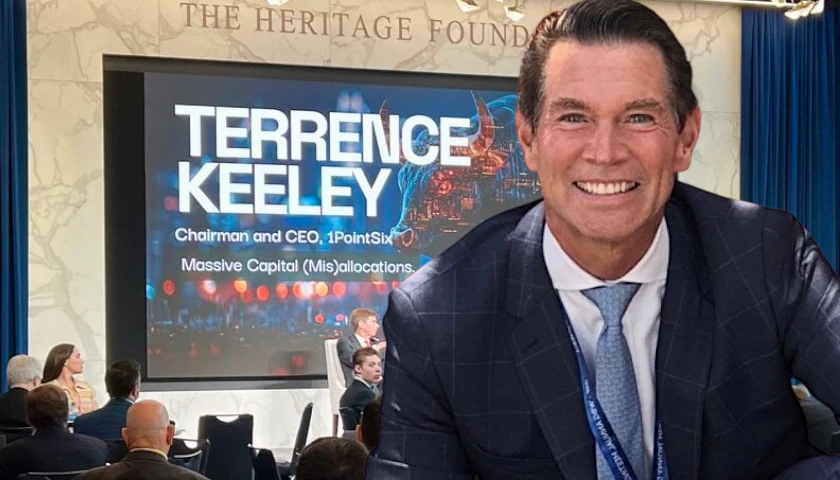by Kevin Killough
The environment, social and governance (ESG) investing movement has faced a lot of criticism over the past couple years for undermining fiduciary responsibility and pushing progressive agendas through an undemocratic process.
At the Energy Future Forum presented by RealClearEnergy Wednesday, Terrence Keeley, author and former senior advisor at Blackrock, argued that ESG is also misallocating resources and doing nothing for the environment it claims to protect.
For “those who are ‘team humanity’ and ‘team abundance,’ it’s not climate deniers that are the problem. Our problem is the tradeoff denier — those who do not see any tradeoffs in these decisions,” Keeley said.
Blackrock has been a leader in the ESG movement, and CEO Larry Fink has been one of its most outspoken promoters.
The forum featured over a dozen experts in a variety of fields speaking on the intersection of technology, money and policy.
In his welcome talk, David DesRosiers, president of RealClear Foundation, said that what the world is doing in terms of energy policy to address the problem of climate change hasn’t been tested on a representative sample to prove its costs and benefits.
“What we’re doing is being tested instead on the fly and at scale. What could possibly go wrong with a command and control reordering of the entire global economy? I think a lot,” DesRosiers said.
Keeley: Divestiture does nothing
In his discussion, Keeley, who authored “Sustainable: Moving Beyond ESG to Impact Investing,” said that the efforts to promote investment products that are in line with the Paris Accords of 2015, an international agreement to limit emissions, are counterproductive.
Broadly speaking, he said, only about 150 companies on the S&P 500 index are completely aligned with the Paris Agreement. This would mean that, in order to divest of every company whose emissions targets met ESG standards, one would have to divest an interest in 350 companies on the index.
“There is simply no way … that you can have an efficient portfolio that is truly risk-adjusted optimized by only investing in 150 companies,” Keeley said.
In broad terms, Keeley said, the tenants of net-zero investment movements underscore the $35 trillion ESG and sustainable investment market, and yet, it hasn’t removed a single ton of carbon from the atmosphere.
Divesting, he explained, does absolutely nothing for the demand side. He pointed out that today, China, India and Russia produce two and half times more carbon emissions than North America and the European Union combined. “We have to be very cognizant that divesting from a certain industry does nothing to the underlying dynamics of that industry,” Keeley said.
Keeley previously served as chairman of the Vatican Financial Reform Commission. The Catholic church divested from industries involving alcohol, tobacco and firearms. “They don’t want to put their capital someplace where they find the activities abhorrent,” Keeley said. “Well, that’s perfectly reasonable.”
However, he said, that divestiture didn’t prevent anyone from smoking, drinking or buying firearms.
So it is with the efforts to divest from oil and gas companies. That will do nothing about the underlying activists themselves, Keeley said. It will, at best, make nations more reliant on Russia and Venezuela for energy.
Mad rush to accept lower returns
In 2020, during the pandemic, inflows to ESG funds were at about $8 billion per day. Keeley said there was a “mad rush” between 2020 and 2023 to invest in clean energy shares, which dropped in value by 60%.
“One would think that taking lower returns in your portfolio should be accompanied by some type of advancement of a social or environmental cause simultaneously, you should have some other compensating. And that is simply not the case with ESG,” Keeley said.
None of the disclosures of the ESG funds, Keeley said, make any statements about having an impact in terms of carbon dioxide emissions reductions or other progressive goals. So, if there had never been an ESG investing movement, he said, the world wouldn’t be very different, except there wouldn’t be this movement that tries to do “backdoor socialism” that presents itself as better than “front door socialism.”
He said people are ultimately trying to get to the same place, but the question remains how best to get there.
“I support the United Nations Sustainable Development Goals. I think most people would do within reason. But do we get there best through team abundance or to scarcity?” Keeley said.
While stating that there’s nothing wrong with taking your own money and deciding to do good with it, he said overall acting according to fiduciary concerns is going to produce far better results.
As an example, he pointed to water bottles, which have less plastic in them today than they did a few years ago. While consumer interest in being “green” played some role, the primary motivation for the companies selling the product is that it is cheaper to make a bottle with less plastic.
“How do we best get there? Do we get there best through team abundance or team scarcity?” Keeley said.
He said the next generation is trying to make more choices that are mindful of sustainability, and corporations will align themselves with that agenda more and more.
“They should be mindful of the outcomes and society that we all want. I think that we all want that. I’m in favor of clean air, clean water and sensible land use,” Keeley said.
– – –
Keven Killough is a reporter for Just the News.
Photo “Terrence Keeley” by Terrence Keeley. Background Photo “Energy Future Forum” by Terrence Keeley.





